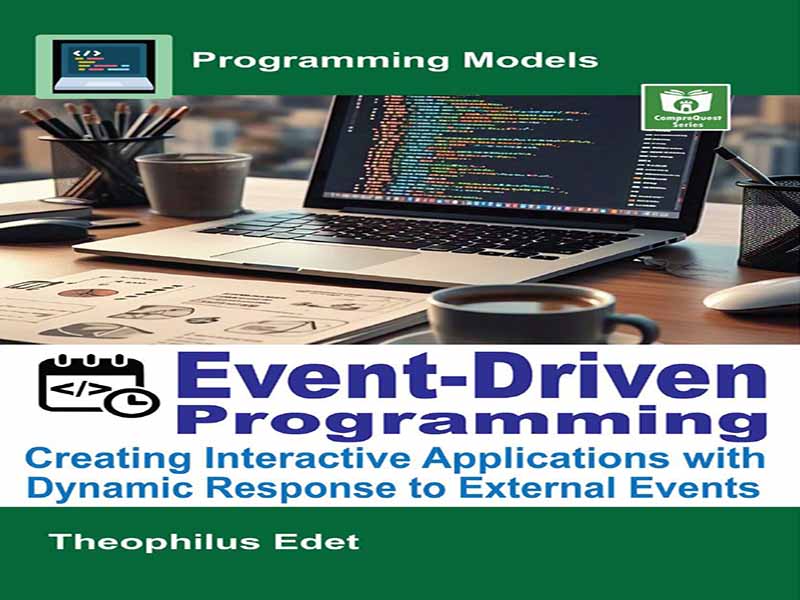- عنوان کتاب: Event-Driven Programming, Creating Interactive Applications with Dynamic Response to External Events
- نویسنده: Edet, Theophilus
- حوزه: اصول برنامه نویسی
- سال انتشار: 2025
- تعداد صفحه: 452
- زبان اصلی: انگلیسی
- نوع فایل: pdf
- حجم فایل: 2.61 مگابایت
در چشمانداز دیجیتال امروز، برنامهنویسی رویدادمحور به عنوان یک الگوی اساسی برای ساخت برنامههای واکنشگرا، مقیاسپذیر و تعاملی ظهور کرده است. از پردازش دادههای بلادرنگ گرفته تا توسعه وب مدرن، معماریهای رویدادمحور، انعطافپذیری و کارایی لازم برای مدیریت محیطهای پویا را فراهم میکنند. این کتاب، برنامهنویسی رویدادمحور: ایجاد برنامههای تعاملی با پاسخ پویا به رویدادهای خارجی، کاوشی جامع از اصول، تکنیکها و کاربردهای دنیای واقعی برنامهنویسی رویدادمحور ارائه میدهد. این کتاب هم مقدمهای برای مبتدیان و هم کاوشی عمیق برای توسعهدهندگان باتجربهای است که به دنبال تسلط بر الگوهای طراحی، معماریها و بهترین شیوههای مبتنی بر رویداد هستند. اهمیت برنامهنویسی رویدادمحور برخلاف مدلهای برنامهنویسی سنتی که به جریان متوالی اجرا متکی هستند، برنامهنویسی رویدادمحور کنترل را به رویدادهای خارجی منتقل میکند و به سیستمها اجازه میدهد تا به صورت پویا به اقدامات کاربر، پیامهای شبکه یا سیگنالهای سختافزاری پاسخ دهند. این الگو ستون فقرات بسیاری از برنامههای مدرن، از جمله رابطهای کاربری گرافیکی (GUI)، سرویسهای وب بلادرنگ، سیستمهای اینترنت اشیا (IoT)، توسعه بازی و محاسبات ابری است. با جدا کردن تولیدکنندگان و مصرفکنندگان رویداد، برنامهنویسی مبتنی بر رویداد، ماژولاریتی، مقیاسپذیری و پاسخگویی بیشتری را در طراحی نرمافزار فراهم میکند. این کتاب به گونهای ساختار یافته است که رویکردی گام به گام برای درک و بهکارگیری برنامهنویسی مبتنی بر رویداد ارائه دهد. این کتاب با مفاهیم بنیادی آغاز میشود و توضیح میدهد که چگونه رویدادها در محیطهای برنامهنویسی مختلف تولید، منتشر و مدیریت میشوند. با پیروی از این مبانی، کتاب مدلهای برنامهنویسی را که از معماریهای مبتنی بر رویداد پشتیبانی میکنند، بررسی میکند و مزایا، چالشها و کاربردهای دنیای واقعی آنها را برجسته میکند. بخشهای بعدی به پیادهسازیهای خاص زبان میپردازند و نشان میدهند که چگونه برنامهنویسی مبتنی بر رویداد در C#، Dart، جاوا اسکریپت، پایتون و سایر زبانها اعمال میشود. خوانندگان همچنین بینشهایی در مورد الگوریتمها و ساختارهای داده بهینه شده برای مدیریت رویداد، تضمین انتشار و پردازش کارآمد رویداد، کسب خواهند کرد. الگوهای طراحی خاص سیستمهای مبتنی بر رویداد به طور کامل بررسی میشوند و به توسعهدهندگان کمک میکنند تا برنامههای خود را برای قابلیت نگهداری و عملکرد ساختار دهند. ماژولهای نهایی بر مباحث پیشرفته، از جمله مقیاسپذیری، قابلیت اطمینان، تحمل خطا و جهتگیریهای تحقیقات آینده در محاسبات مبتنی بر رویداد تمرکز دارند.
In today’s digital landscape, event-driven programming has emerged as a fundamental paradigm for building responsive, scalable, and interactive applications. From real-time data processing to modern web development, event-driven architectures provide the flexibility and efficiency required to handle dynamic environments. This book, Event-Driven Programming: Creating Interactive Applications with Dynamic Response to External Events, offers a comprehensive exploration of the principles, techniques, and real-world applications of event-driven programming. It serves as both an introduction for beginners and a deep dive for experienced developers looking to master event-driven design patterns, architectures, and best practices. The Importance of Event-Driven Programming Unlike traditional programming models that rely on a sequential flow of execution, event-driven programming shifts control to external events, allowing systems to respond dynamically to user actions, network messages, or hardware signals. This paradigm is the backbone of numerous modern applications, including graphical user interfaces (GUIs), real-time web services, Internet of Things (IoT) systems, game development, and cloud computing. By decoupling event producers and consumers, eventdriven programming enables greater modularity, scalability, and responsiveness in software design. This book is structured to provide a step-by-step approach to understanding and applying event-driven programming. It begins with fundamental concepts, explaining how events are generated, propagated, and handled within different programming environments. Following this foundation, the book explores programming models that support event-driven architectures, highlighting their advantages, challenges, and real-world applications. Subsequent sections delve into language-specific implementations, demonstrating how event-driven programming is applied in C#, Dart, JavaScript, Python, and other languages. Readers will also gain insights into algorithms and data structures optimized for event handling, ensuring efficient event propagation and processing. Design patterns specific to event-driven systems are thoroughly examined, helping developers structure their applications for maintainability and performance. The final modules focus on advanced topics, including scalability, reliability, fault tolerance, and future research directions in event-driven computing.
این کتاب را میتوانید از لینک زیر بصورت رایگان دانلود کنید:
Download: Event-Driven Programming



































نظرات کاربران